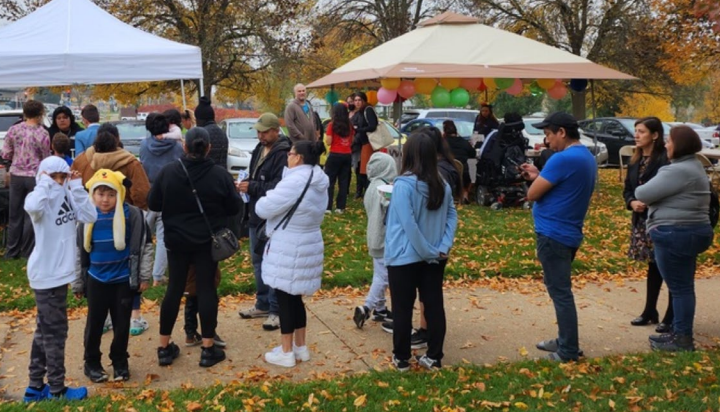By Ben Varik, Frida Ballard, Stanley Rubio Jackson
Ben Varik reports from Madison Labor Temple’s Labor Temple’s Park St. front lawn, “A light drizzle couldn’t hold back the crowds and delicious flavors at the El Chisme food truck on Wednesday afternoon [October 25]. I had a bowl of elote (Mexican street corn with mayo, cheese, and chile powder) and al pastor tacos (pork), washed down with a warm horchata (warm, sweet rice and cinnamon drink). The event was launching the local workers cooperative and folks were handing out informational flyers. The food was delicious, the scene was lively, and conversation was flowing: a great afternoon treat.”
Frida Ballard of Worker Justice Wisconsin (located in the Labor Temple) explains El Chisme’s motivation for transiting from a “family-owned and run business” that “hires additional help during the busy summer season” to a Worker Co-operative: El Chisme has served Madison for 8 years and decided to become a Co-op because “they already worked in an equitable way,” distributing “responsibilities and earnings depending on the work put in.” As they considered their future – “benefits, retirement,” and business sustainability – they wanted the “additional union and co-op support” that they would receive as “a pro-worker company.”
What is a “Worker Co-operative”? Worker Justice Wisconsin defines a worker cooperative as “a values-driven business that puts worker and community benefit at the core of its purpose… Workers own the business, and they participate in its financial success on the basis of their labor contribution to the cooperative. Workers have representation on and vote for the board of directors, adhering to the principle of one worker, one vote.” Worker Justice Wisconsin grew out of the merger of the Interfaith Coalition for Worker Justice and the Workers’ Rights Center in 2018.
Frida notes, Worker Justice makes “the process of co-op development accessible to Latine workers, both linguistically and culturally. This is why we focus on this population in particular – there’s so much exploitation of the Latine working class, so they have everything to gain from cooperatives.” She adds, “The Madison cooperative scene also has a lot to learn from the Latine community in order to be more accessible to nonEnglish speakers, immigrants, and young people. I hope that we can help foster a multinational coalition of cooperators in Madison one day, with shared knowledge and resources!”
You can try their menu and support El Chisme by visiting them at 5800 Raymond Rd., near the Meadowridge Library, 5pm – 8pm, Monday through Friday. Or by ordering for events by calling Lupita at (608) 209-4184.

